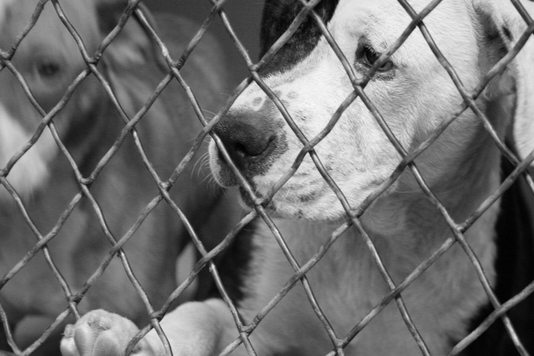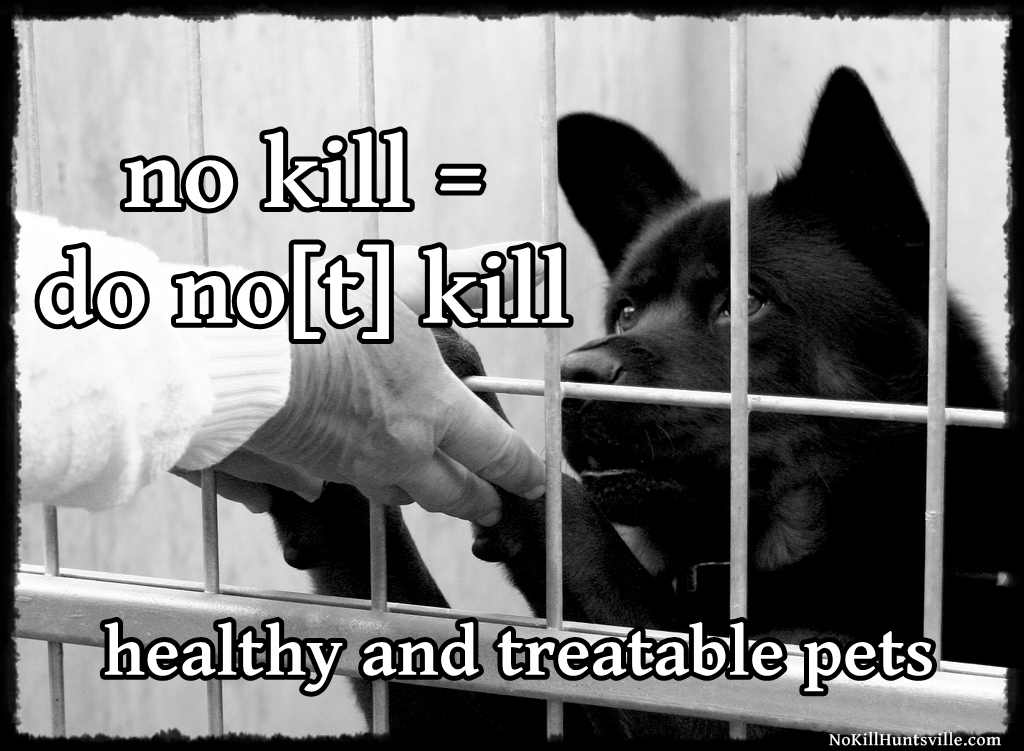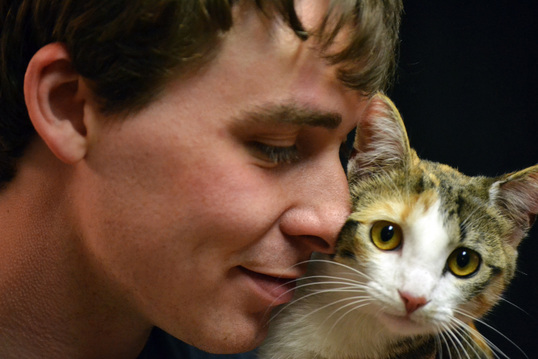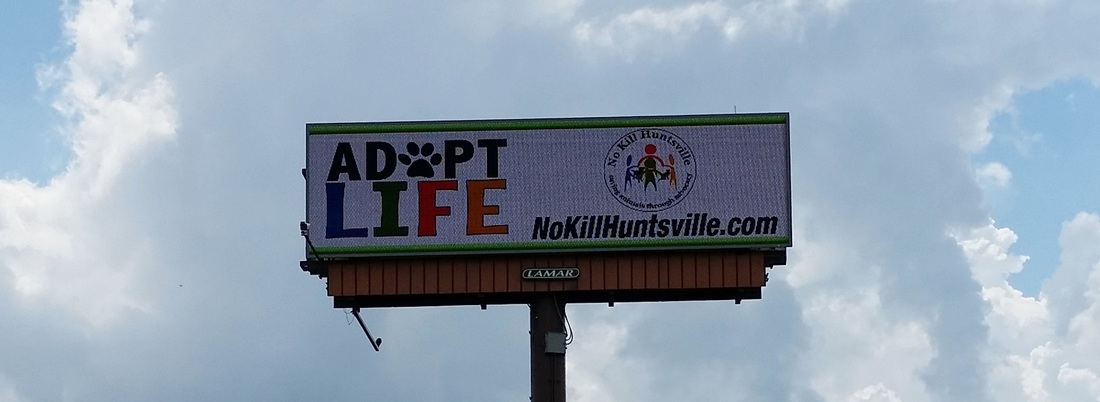|
Let's talk about words today. More specifically, let's talk about one word: euthanasia. We read a number of media reports late last week about the fact that our shelter planned to euthanize animals for space if people did not come to adopt them. We fully understand that the shelter needs to communicate with the public about placing animals when the shelter is near capacity. In that regard, we encourage Huntsville Animal Services to be completely transparent about what is happening. We find improper use of The E Word related to population reduction to be both offensive and irresponsible.
The dictionary definition of euthanasia is simple: the act or practice of killing or permitting the death of hopelessly sick or injured individuals (as persons or domestic animals) in a relatively painless way for reasons of mercy. When we destroy animals who are suffering or are irremediably ill, that is, in fact, euthanasia. Destroying healthy and treatable animals is not euthanasia. It is not merciful, it is not beautiful and it is not necessary. It is not "putting them down" or "putting them to sleep" or preventing "a fate worse than death." We use those phrases - and many use the word euthanasia - to sugar coat the reality of the act. And because we have allowed ourselves to become callous to, or complacent about, killing of shelter animals, we accept that word because it makes us feel better somehow, as if we did a good thing. When we destroy healthy and treatable animals we are doing just that. We are destroying them and we are killing them. If you have ever made the heart-wrenching decision to euthanize a beloved pet which was genuinely suffering or so ill that any treatment would likely causer more pain or suffering, you know exactly what euthanasia means. To compare the euthanasia of your companion to the destruction of a healthy or treatable animal for space or convenience serves only to devalue both of those lives. And any person who ever lost a beloved pet to an "oops" killing at an animal shelter would not say their dog or cat was euthanized. In No Kill communities, healthy and treatable animals are not destroyed. Period. They are saved. And words are used for what they mean. Let's stop calling this anything but what it is. Once we do that, we can have a realistic conversation about what takes place in our shelter and we can take a look at why population control killing is still an option here even though many people believe that Huntsville is already a No Kill Community. It is not. When we met with a city official in early June to ask the city to commit to no longer destroy healthy and treatable animals, the answer we received was, "no. The city will not commit to that." We later wrote a letter to the Mayor and City Council to ask for a commitment. Our letter has gone unanswered.
0 Comments
We consider the no kill movement a social movement. Although many people view what takes place in tax funded animal shelters as an "animal problem," it really is a "people problem." The reasons why animals have historically died in our shelters has everything to do with individual and collective behavior and the animals are simply the unfortunate victims of our poor choices and our poorly functioning shelter industry in our country.
Social movements are all about change. About reform. In the case of animal shelters, rare is the situation where a municipality or the board of an animal shelter engages in reflection and decides to stop destroying animals with no outside influence to do so. There is normally a tipping point which is reached due to outside influences of some kind. The path from Point A to Point B is often incredibly difficult and it involves a lot of struggle and conflict. Those who seek change on behalf of a community or in support of a cause very rarely do so seeking any form of recognition. The end goal is the focus and once that goal has been reached, they are simply grateful for the change and happy to be able to go on with their own lives. It is an unfortunate reality in the no kill movement that people revise history and they do so to the detriment of our entire society. As has been said by Ryan Clinton, the Austin Attorney who played a key role in FixAustin, "when we rewrite history, we learn the wrong lessons. And the lesson from Austin is that it was a long battle." The same could be said about a host of other communities across the country, including Huntsville. It has been a struggle and a battle which has gone on for years and that struggle is part of our history. So. Why is that important? It is important not because those involved in the struggle - the members of our coalition - seek any form of recognition for our efforts. This is not at all about credit or someone telling us what a good job we did or that we are doing. This has truly never been about us, it has always been about saving the lives of shelter pets and we honestly wish that our advocacy role had not been necessary at all. We wish the City of Huntsville had taken steps to stop killing animals back in early 2009 after learning about the no kill equation. Or that the city had accepted the offer of free and confidential help from subject matter experts back in April of 2013. Had either of those things happened, our coalition either would not have been necessary at all or we would have taken a completely different path in our efforts to help the City of Huntsville become a no kill community. We took this issue to our public only when we hit a wall in terms of cooperation and we felt we had no alternative but to go around that wall for the sake of the animals being destroyed needlessly using our money and in our name. We get email messages, calls and contacts from advocates across the country wanting to know what we did in Huntsville and how it is that the city is now saving the vast majority of animals in our shelter. It is important not to rewrite history or to sugarcoat it in any way to take out the struggle because doing so sends the wrong message and teaches people the wrong lessons. Just like Austin, the lesson from Huntsville is that this has been a battle which has gone on for years. The city didn't just suddenly decide one day that it was a terrible idea to destroy perfectly savable animals in our shelter and to stop doing that on its own. We had to push the issue and we had to stay on subject, as we are now. There are those who are revising our history here. Some of them are local and they are leaving out part of what has taken place either to make themselves look better or to make our coalition look like the bad guys for having had the audacity to say "enough." Others who are revising our history do not live or work here and are doing so in order to advance an agenda which either suits their message or which promotes a consulting organization which played a role here and which is now gaining new clients by making it sound like they came here and fixed what was broken. If you live here or work here, our message to you is this: we are not yet a no kill community. Yes, the city is doing an incredible job and has made a lot of positive changes. The city has yet to commit to ending the outdated practice of destroying healthy and treatable pets and there are issues with program development. A clear sign of that is that the shelter adopted out 183 animals in a matter of days during a recent event and promptly turned around and claimed the shelter was full again and that no incoming animals would be accepted. If you are not from here and you are trying to seek shelter reform in your own community, we encourage you to learn about the programs and services of the no kill equation. We encourage you to first reach out to local officials and try to work with them to save the lives of animals and that you do so diplomatically and respectfully. If that doesn't work and you are rebuffed, make a decision on whether or not this issue is important enough to you to potentially spend years speaking out about it, possibly to the detriment of your personal reputation and well-being. Even once you do speak out for change, we encourage you to focus not on individuals but on the leadership of the shelter. We also encourage you to remain respectful and diplomatic, even when that behavior is not reciprocated as was the case with us. If you are not from here and you are rewriting our history to leave out parts of our story, shame on you. Doing so is both arrogant and irresponsible. You cannot possible know what has transpired in our community if you have not been part of this community and played a role in change here. You do a disservice to the very causes of animal welfare you claim to support by making this process seem like it was free of conflict and that it can be replicated in some other place just by hiring a particular consultant or by being "nicer" about the message. Our story is still unfolding. We are not a no kill community and we may never be. That is entirely up Mayor Tommy Battle, the members of our city council, City Administrator John Hamilton, Shelter Director Karen Sheppard and the people who live and work here. It is entirely possible that for Huntsville, better is good enough. But please don't rewrite our history. Doing so can have adverse affects far beyond our region and in the end, it's really a little too early to stand around and pat each other on the back as long as healthy and treatable pets are still at risk at 4950 Triana Boulevard Southwest in Huntsville, Alabama. No Kill Huntsville was formed in January of 2012 when a group of local nonprofit shelter directors, rescue group leaders and animal welfare advocates decided to come together to speak with one voice with one mission: to seek a time when Huntsville becomes a No Kill Community. We had been working independently of each other on this issue for years and felt that we could accomplish more if we banded together. We felt that the City of Huntsville was not taking enough action with enough of a sense of urgency to save the lives of healthy and treatable shelter pets so we took on the responsibility of speaking out to seek better. We have always sought to become irrelevant not because we are being ignored or have been dismissed as zealots, but because we are simply no longer needed in this capacity. Despite rumors to the contrary, we have also approached this issue as one of municipal accountability. We have taken great pains to make our communication with the city both respectful and empowering in spite of having been subjected to personal attacks against us for having the audacity to be outspoken. Change is hard and it makes people uncomfortable. We get that. We have a page on our website called Our Vision which paints a picture of a time when Mayor Battle stands at a podium and makes a public declaration of intent that Huntsville will, in fact, become a No Kill community. Over the course of the years of our advocacy, we have done what is called “the ask” multiple times. The concept is simple: we have asked the city to draw a line in the sand and commit that from that point forward, savable animals will no longer be at risk in our municipal animal shelter. That every animal will be treated as an individual life with value and that we will not destroy healthy and treatable animals for space or convenience because doing so is just not consistent with our culture here. The City of Huntsville has not yet committed to this standard. The city has absolutely made a lot of changes in the way our animal shelter functions and we have seen a shift in how the shelter is referred to. The mind set has gone from one being resigned to the destruction of animals to working hard to save those same animals and have the shelter be a place of hope and new beginnings. Some mistakenly believe that Huntsville is already a No Kill Community. It is not. Although the statistics for the shelter show marked improvement from a statistical standpoint, the measure of a No Kill Community is not achieving some numerical standard. It is a matter of saying “we just don’t do that any more” and ensuring animals are not at risk. That may mean that the “live release rate” for animals is 97% in one month and then 87% in the next month, provided that the decline was due to a large number of animals entering the shelter who were suffering, irremediably ill (as opposed to entering the shelter healthy and then becoming very sick due to being housed there) or genuinely aggressive to people and which constitute a public safety risk. On June 20, 2016, we sent a letter to Mayor Battle and the members of the Huntsville City Counsel to again do “the ask.” You can read the letter in its entirety here. We also issued a press release on our challenge to the City on July 5, 2016. It is found on al.com and it was distributed to our local television stations. As we state in our letter, we fully acknowledge the tremendous progress made by city officials to change how our shelter operates and how animals are cared for using our tax dollars. This has become a point of pride and Huntsville is being watched by people in other areas of the country who are hoping to make similar changes. We genuinely believe that the progress made to date demonstrates that the City of Huntsville is in the best possible position to make a public declaration of intent. Once it does so, this will encourage people who live and work here to become even more involved in the operation and success of the animal shelter than they are now and it will be a wonderful addition to our community resume when we talk about all the things which make this City great and make it the “Star of Alabama.: Becoming a No Kill Community is a choice. It is an act of will. We have absolute faith that the City can do it. We just hope the City will share our opinion, draw that line in the sand and that the answer to “the ask” will be a resounding, “Yes.” (image courtesy of Bryan Williams)
We have a page on our website where we post shelter statistics. They go back to 2008. The most recent statistics we have on the site are the monthly figures for December of 2015. We were asked yesterday why we don't have the year end numbers for 2015 and the monthly numbers for January and February of this year. We don't have them posted because the city has not provided them to us.
In Alabama, records related to the operation of the government are public records which can be sought by any person and for any reason under the Alabama Open Records Act. There are some exceptions to the Act, but it is pretty broad in terms of access and the records can be sought by anyone, whether they live in Alabama or not. When it comes to Madison County, seeking animal control records is a pretty simple process. We call or email the Animal Control Director and he provides the records, normally within a matter of minutes or hours. When it comes to the City of Huntsville, the process is not so simple. We have been given very clear instructions that we are not to communicate directly with the Animal Services Director and that our records requests must be submitted to the City Attorney's Office to be processed. This means that we prepare a letter each month which we submit to the City Attorney's Office setting forth the records we seek. We have been trying to get records regarding dogs destroyed in the last quarter of 2015 for months. We have been trying to get the 2015 year-end statistics since January. Our last letter to the City Attorney's Office was sent on March 7, 2016. We have considered speaking to an attorney for help in getting the records we seek. We have also considered getting the media involved. We have not yet decided what we plan to do about this issue. The records we seek don't have to be created. They already exist and it is a matter of printing them off of a computer or otherwise saving them as a .pdf file. In spite of the opinions of those who oppose us for our advocacy, we have worked incredibly hard since our coalition formed to be both diplomatic and respectful in our communication with and criticism of the city and Huntsville Animal Services. We have made a concerted effort to applaud progress made by the city even when we have been under attack on social media. In the fall of last year, a "hate" page was created about our coalition on Facebook. We didn't talk about it publicly we didn't want to draw attention to it. It contained content which was juvenile, vulgar and libelous, much of which was "liked" and commented on by city employees, shelter volunteers and prominent members of local rescue organizations. We took steps to try to have the page removed while refusing to stoop to the level of those who felt that type of behavior was appropriate or productive. As they saying goes, we just would not "go there." The city has made enough progress in the last year that there is little point in remaining overly critical and risk having people think we won't be satisfied with any level of progress. Although ours is not yet a no kill community, Huntsville has made a great amount of progress in a short amount of time and the value of that cannot be overstated. We remain hopeful the city will make a commitment to make ours a no kill community and declare that healthy and treatable animals are not at risk under any circumstances. We believe that with increased progress and increased expectations by the city that the public will both be part of change and fully support change comes the need for complete transparency in record keeping. It is vital in order to both get and maintain the public trust. The ASPCAs Position Statement on Responsibilities of Animal Shelters speaks to this very point: Goal 4: Animal sheltering is increasingly transparent The ASPCA strongly supports a requirement that key records and data be maintained by all shelters, both public and private, routinely reported to an appropriate central entity, and made available to the public. While much of this information, for public shelters at least, may already be considered a public record under various state laws, the ASPCA believes that standardizing the information that must be collected and extending these requirements to private shelters is not only an important step toward transparency, but also an effective way to gain a fuller picture of the community’s at-risk animals. When the only information available concerning intake and outcomes is that which must be provided by public shelters through Freedom of Information Act (FOIA) requests, the public is receiving an incomplete and perhaps distorted representation of these matters. There is a video on the city's Youtube channel which shows Mayor Battle interviewing Dr. Sheppard about the operation of Huntsville Animal Services and talking about the tremendous progress made at our shelter in recent months. At one point in the interview, Mayor Battle calls Dr. Sheppard a star. Although we have been quite complimentary of that progress, it is somewhat difficult for us to be quite as thrilled with the progress because of the city's lack of transparency regarding the shelter records. Once we have been provided the records we seek, we will post them on our website. The City of Huntsville should have nothing to hide. And we look forward to seeing that with our own eyes very soon when we are provided the records we have sought not just for us but for our entire community. Huntsville is getting a lot of attention these days across the country as a result of the progress made at our municipal animal shelter. People who live and work here are thrilled with the progress, as they well should be. Shelter animals are now safer here than they have ever been in the history of the community as save rates have reached and then exceeded 90% of all shelter intake. Huntsville is being referred to as an example of what can happen “in the south” with a shift in focus and using the compassion which exists in an animal loving community. We are not yet a true no kill community, but we are incredibly close to a time when the city can (and should) make a public declaration of intent that healthy and treatable animals are no longer at risk here moving forward, regardless of the circumstances we may face.
It has been said that if we do not learn from history, we are bound to repeat it. It has also been said that in order to learn from history, it must be factually accurate. When we modify the sequence of events which transpired to get from Point A to Point B, we more often than not will learn the wrong lesson. For all of our applause of the city for the progress which has been made, the reality in our community is that this process has been a struggle and did not come easily. If you have been told or have heard a version of the history which led to this progress and the story begins with the city voluntarily making sweeping changes, you have been told a history which is devoid of facts and which has been sanitized. This rewriting of history has occurred related to other locations like Reno and Austin and it is not uncommon in this social movement. Perhaps it just makes a lot of people uncomfortable to think about some of the more unpleasant parts of those stories. Huntsville city officials were first introduced to the no kill philosophies we promote in late 2008 at a time when three out of every four animals entering the shelter were destroyed. By early 2013, when the city was offered free help from subject matter experts in order to do better and refused that help, more than half of the animals in the shelter were still being destroyed each year. The city's position at that time was that the shelter was doing a beautiful job and doing all it could to save lives - even when the save rate was just over 40 percent. We first took this issue to the public in the spring of 2013, having reached the conclusion that city officials were satisfied with how the animal shelter was operating. We felt it would take public pressure and demand to force the city to reconsider spending our money on death rather than on life. There will always be a degree of dispute about exactly what led to the progress we now see. There have been many factors involved in this process, not the least of which is the arrival on the scene of a new city administrator who told us in early 2014 that he supported change and that he too wanted the city to save the lives of all healthy and treatable shelter animals. We know we have had a role in the history here and firmly believe that but for our advocacy, little would have changed. The path taken to get to this point, and the particular struggles faced along the way, are not directly relevant to us here in Huntsville now that we have “arrived” for the most part. But those facts are entirely relevant to communities outside of our own which may look to our progress and wish to replicate it themselves. We do a disservice to those places if we behave as if our progress here was achieved by reaching across differences, finding common ground and all working together to seek a newer and better future. Yes, our community has achieved tremendous success. But it took years longer than it would have taken had the city simply decided to act on its own many years ago and without the necessity of a group like ours to demand accountability from the city, a process which has taken a great toll on everyone involved. Make no mistake - this is not about credit. We have always said that we seek to become irrelevant as a coalition not because we are being ignored, but because we are no longer needed to be boat rockers for community change. We have sat silently on the sidelines while others have taken credit for the changes which have been made here and we plan to continue to do just that. Why? Because this is not at all about people and patting each other on the back and it is very much about saving lives. But this is also about being honest about our history here so that others can learn from it and perhaps avoid some of the conflict we endured. Much of what took place here was unproductive and led to a higher body count. A time will come in the history of our country when all municipal shelters are no kill shelters and all communities are no kill communities because that is what the public wants and will demand. We encourage any community outside of our own which is looking at our progress to take proactive steps to get ahead of this issue and make change voluntarily. Listen to the advocates and animal lovers who come to you with ideas, enthusiasm, research and help. They often know much more about the subject than you may imagine and it is likely they are networked with subject matter experts who can guide and help your community to achieve change not in years but in weeks or months. Invest your time and focus into doing what is right so that energy is spent not on struggle and conflict, but on saving the lives of the animals we say we love and value. For those of you who have come to our website and are wondering if we still exist, yes. We are still here.
Late last year we made a collective decision to change our engagement in the community as a result of the fact that Huntsville Animal Services had made quite a bit of progress in saving animals. Although we still have some concerns regarding program development and sustainability, there is little to be gained by repeating ourselves for the sake of emphasis. We have made a number of recommendations regarding our concerns and have been told that the city "is and will continue to engage with industry experts in shaping the policies and procedures used in the shelter. We are extremely pleased with the progress. . .over the last couple years and confident that conditions are being set to continue that progress." We are essentially in a holding pattern while we wait to see what happens in the months to come. A recent post by the Huntsville Animal Services on Facebook indicated that during 2015, the shelter "housed right at 3,218 dogs and 1,973 cats (5,191) releasing alive right at 2,738 dogs and 1,812 cats (4,550) and having still 287 pets in our shelter and foster home program." We have requested statistics for the year and have requested copies of records related to dogs destroyed in the last three months of the year so we can continue our analysis of the reasons why dogs are destroyed. Once we have those records, we will post them on our website. We understand that there are many people in our community who are still angered by or unhappy with our advocacy. Some of them are with local rescue groups, some of them are shelter volunteers and some of them have chosen to go on the attack against us personally for our advocacy. As much as we find this type of behavior unproductive (and in many cases libelous) there is little we can do to stop it and we simply will not be baited by it. We have much better ways to spend our time than to try to engage in discourse with people who attack the messenger while completely losing sight of the message. We did not relish having to come together to seek better for our community in the first place. We are all incredibly busy and advocacy takes a toll in terms of time, money and emotional energy. There are no days off. We have no regrets for having been the boat rockers for the sake of the lives of companion animals and the people who live and work here. We would ask those who find our advocacy too outspoken to consider this one fact: if local officials had chosen to embrace no kill philosophies years ago and on their own after having been introduced to those philosophies, our coalition never would have been necessary in the first place. As the saying goes, "we didn't start the fire." We hope you will stay tuned in the months to come as we sit back, watch what happens and continue in our role of keeping the city honest. Will we become a no kill community in 2016? We certainly hope so.
When our coalition first formed in January of 2012, we had one goal in mind: to speak with one voice toward making ours a no kill community - a place where healthy and treatable shelter animals are not at risk and are not destroyed using our tax dollars. We developed a Facebook presence in April of 2012 in order to reach more people in the community and share our vision of Huntsville as a no kill community. We have always sought to become irrelevant not because of lack of interest, but because we simply are no longer needed in this particular advocacy role.
The City of Huntsville is nearing the end of the most successful year of animal sheltering in the history of the city. The numbers for the entire year have yet to be calculated; we presume that the live release rate will be near 90% and may even exceed that percentage. The city has openly stated that it hopes to do even better in the coming year and city leaders are clearly energized about the public’s response to calls for community involvement in saving shelter pets. As we begin the new year, we have moved away from Facebook and reverted to our primary means of communication which is our fully developed website. We will be blogging from our website periodically in order to keep supporters posted on news of interest and the latest local developments. We remain hopeful that the progress achieved by city officials to date can be sustained. We look forward to a time when the city makes a public declaration that it plans to become a genuine no kill community and that healthy and treatable shelter animals are no longer at risk in our municipal shelter under any circumstances. We still have some concerns about program development, but we can envision no circumstances under which the city would revert back to the old ways of functioning. We hope you will stay tuned as we begin a new and exciting chapter in the history of Huntsville and Madison County and as this community demonstrates to the entire region what can happen when we have faith in the compassion of the animal-loving public. The next logical step following a public declaration of intent is for the city to codify the manner in which the municipal shelter operates so that progress can be sustained not just for the short-term, but for years to come by enacting a Companion Animal Protection Act. More information on this and other programs that sustain the progress and can better serve the animals and the public can be found on our website. Will 2016 be "the" year we become a no kill community? We have faith in those who lead us and in our community to do just that. |
No Kill Huntsville
Keep up with our updates and latest news regarding Huntsville becoming a no kill community. Archives
January 2022
Categories
All
image courtesy of Terrah Johnson
|






 RSS Feed
RSS Feed
